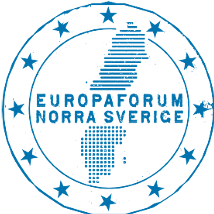European Forum of Northern Sweden (EFNS) is a network for politicians at the local and regional
levels from Norrbotten, Västerbotten, Jämtland Härjedalen and Västernorrland. EFNS is a meeting
place and knowledge arena where EU policies are analysed and discussed in respects where it affects
northern Sweden. EFNS monitors European issues to influence EU legislation, EU strategies and action
programmes, and the EU budget. The purpose of EFNS is to safeguard the interests of northern
Sweden both in the European arena and in relation to national level issues with a clear European
perspective.
Please accept our points of view on the proposal for an EU-framework for carbon removals
certifications.
Europaforum Northern Sweden (EFNS) welcomes the proposal for a common EU-framework for
carbon removals certifications. When new business models develop, and a market is young, it is
important for all parties involved with common rules. Long-term stability with regards to regulations
will help an evolving market.
It is also important that this market creates incentives for long-term carbon storage, which is why
EFNS emphasizes the importance of storage in buildings for long-term stability of coal sinks.
We also recommend an analysis with regards to possible effects on forestry and agriculture.
Is there a risk of lower production of essential commodities such as food and woody raw materials? If
so, we need to know more about how it may affect the supply of such essential commodities in times
of need for preparedness and safety.
Our points of views are as follows:
We welcome the initiative to create an EU-framework for carbon removals certifications and that
its aim is to support a free and open market.
An EU-framework for carbon removals certifications should be designed to favour carbon storage
in long-lived products such as wooden buildings. This would favour the production of high-quality
timber which contributes to climate goals through a long growing time and therefore high absorption
of carbon dioxide before harvest. Coal sinks in buildings are significantly more reliable in the long
term than coal sinks in standing forests, which face risks in the form of storm damage, snow fall
damage, rot, wildfire, and extensive insect attacks. Risks such as insect infestations and wildfires will
also increase over time with higher temperatures because of global warming. Therefore, EFNS would
like to see wooden buildings included and regulated in the original text and not left to be added on
later by a delegated act.
We emphasize that an EU-framework for carbon removals certifications should be based on
voluntary participation on behalf of all parties in the market.
We believe an analysis is needed with regards to the effects on forestry and agriculture to evaluate
if the initiative creates a risk of lower production of essential commodities such as food and woody
raw materials. If so, how large is this risk and what effects may it have on the EU-economies, and the
supply of essential commodities in the short-term and long-term when it comes to safety and
preparedness?
An independent supervisory body is needed to guarantee a fair market with equal rules.
When it comes to the proposal of the extended use of delegated acts during implementation, we
wish to see clear limitations as to the use of these written into the regulation. The member countries
need to retain national influence over the implementation. As an example, the monitoring system of
land – and thus of land managers – that the European Commission wants to introduce needs to be
controlled by EU member states.
We do not believe a central EU-based monitoring system is needed nor would be accepted.
Instead, the nations´ themselves should manage surveillance based on common EU criteria related to
the carbon removal framework.
Monocultures could well be included in the EU-framework for carbon removals. First,
monocultures are highly unusual, at least in Sweden. We have about four percent of this type of
forest with only one species according to our one hundred years old university-based forest
monitoring system. A monoculture may be the result of a certain type of dry forest land where only
one type of dry-resistant tree species survives. Birch forests on northern mountains (fjällbjörkskogar)
may also be the only tree species in an area. A monoculture may also be the result of a very long
growth period with no thinning where one species has grabbed all space and where a closed crown
cover has blocked off sunlight from reaching the forest floor, thereby preventing other species from
thriving. This may be an oak forest or a beach forest, which are both valuable forests. It makes little
sense to exclude these types of forests from a carbon removal system.
Adopted by European Forum of Northern Sweden on 03 May 2023
Jonas Andersson (S)
Chair EFNS
Region Jämtland Härjedalen
Elise Ryder Wikén (M)
Region Jämtland Härjedalen
Lars-Gunnar Nordlander (S)
Municipalities in Jämtland
Härjedalen
Daniel Danielsson (C)
Municipalities in Jämtland
Härjedalen
Åsa Ågren Wikström (M)
Vice Chair EFNS
Region Västerbotten
Rickard Carstedt (S)
Region Västerbotten
Ann Åström (S)
Region Västerbotten
Anders Öberg (S)
Region Norrbotten
Isak Utsi (S)
Norrbotten Municipalities
Ulrica Hammarström (S)
Norrbotten Municipalities
Mats Hellhoff (SD)
Region Västernorrland
Jonny Lundin (C)
Region Västernorrland
Erik Lövgren (S)
Västernorrland
Association of Local
Authorities
European commission’s proposal for a carbon removal certification framework

